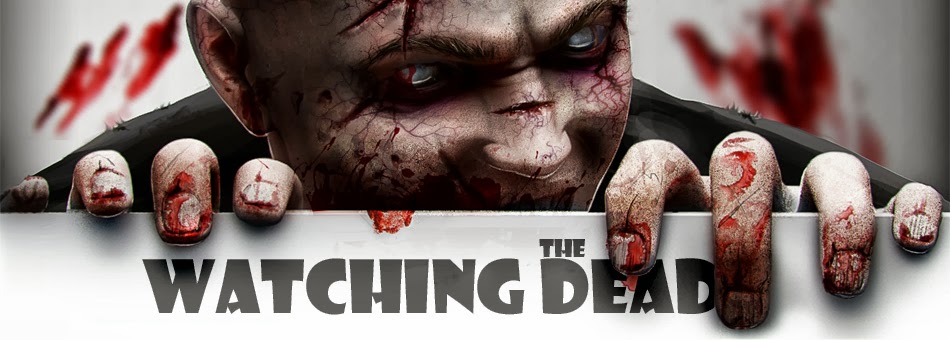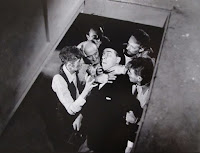Contains spoilers.
I'd be lying if I
said this quintessentially low budget European horror was good. I'd be equally
disingenuous if I was to be overly harsh. Director José Luis Merino's La Orgía
de los Muertos (translated as The Orgy of the Dead), otherwise known as Beyond
the Living Dead (US), Zombies - Terror
of the Living Dead (UK), and finally and most popularly in the US, The Hanging
Woman, in truth, is a distinctly mediocre gothic mad-scientist whodunnit dotted with enough distinctly brilliant and memorable moments that it almost
fools you into thinking it's better than it is. The story, characters and acting is
as equally laboured as It is convoluted and discordant, and despite Paul Naschy
being Paul Nashy in his prime, he can't, this time, save the film entirely on
his own mainly because his involvement was actually quite limited, due to parallel film commitment.
 Serge Chekov
(Stelvio Rosi as Stan Cooper) returning to his late uncle's estate for the
reading of the will stumbles upon the grizzly scene of, whom he soon discovers
to be, his niece's fresh corpse hanging from a tree. Then finding himself the, for all intents and purposes, sole benefactor he's quickly embroiled in a web of scheming and
distrust, black magic and murder, in a claustrophobic and isolated backwater mansion with a cast of disparate and quite disturbed figures.
Serge Chekov
(Stelvio Rosi as Stan Cooper) returning to his late uncle's estate for the
reading of the will stumbles upon the grizzly scene of, whom he soon discovers
to be, his niece's fresh corpse hanging from a tree. Then finding himself the, for all intents and purposes, sole benefactor he's quickly embroiled in a web of scheming and
distrust, black magic and murder, in a claustrophobic and isolated backwater mansion with a cast of disparate and quite disturbed figures.
There's Igor (Paul Naschy), the
crazy-eyed, dishevelled cemetery caretaker who we learn is also quite the
necrophiliac and all round pervert; there's the newly widowed Countess Nadia
Mihaly (Maria Pia Conte) who wants Serge to sell and is happy to persuade with
sex, satanic ritual and voodoo; there's Professor Leon Driola (Gérard Tichy),
the permanent guest of the late Count who specialist research is electricity
and the nebulous curtain of death, and there's his daughter, the Countesses
maid Doris Droila (Dyanik Zurakowska) who wants Serge to actually keep the estate
for her father's sake.
 At some point each
and every one supplies motive and means to explain the, for at least an hour,
rather sketchy, zombie murder mystery, and each and every one provides a
discordant sub-narrative with Serge at the centre. And Serge loves it. Making
the lead character and hero such an entitled obnoxious cad is either brave film
making or suicide, as whether he's taking advantage of young vulnerable
daughters or engaged in yet another innocuously provoked fist fight he's
incredibly difficult to either empathise with or rally behind. Even as the
credits rolled and he'd solved the case, and rescued and won the girl I
couldn't help hope there would be some late twist and he'd still get the zombie
maul he undisputedly deserved.
At some point each
and every one supplies motive and means to explain the, for at least an hour,
rather sketchy, zombie murder mystery, and each and every one provides a
discordant sub-narrative with Serge at the centre. And Serge loves it. Making
the lead character and hero such an entitled obnoxious cad is either brave film
making or suicide, as whether he's taking advantage of young vulnerable
daughters or engaged in yet another innocuously provoked fist fight he's
incredibly difficult to either empathise with or rally behind. Even as the
credits rolled and he'd solved the case, and rescued and won the girl I
couldn't help hope there would be some late twist and he'd still get the zombie
maul he undisputedly deserved.
The zombies are one
of the true highlights of the film and it was a pity it took such a long time
to get to see them in all their splendour. Fetid, crusty and decaying, they're
the epitome of the seventies walking dead infamously popularised by Fulci later
in the decade. Unlike the esoteric mystical nature of Fulci's creation though,
these guys have a mad Victor Frankenstein scientist and rational excuse for
their reanimation. Spoiler… it was
Professor Leon you see, and not any of the black magic or voodoo thrown in to put us of course. As well as learning the
secrets of electrical resurrection he's also a whizz with micro-technology, designing and manufacturing a 'capsule' that slots in the corpses brain to both control its actions as well as pick up his thoughts. They're mindless drones
incapable of independent thought driven solely to obey their master and the
murders were all perpetrated at the behest of the prof who first wanted to kill
his partner the count, to stop him using the discovery to amass 'an army of the
dead'. The rest of the victims, beginning with the hanging woman, were unlucky dominoes that fell as the ever desperate Leon tried to cover his tracks. An interesting zombie twist to
note at the end of the film and starting with the now resurrected Naschy, of a disobedience and demonstration of
independent murderess intent, with the professor no
longer able to exert control. It lead to a lively and satisfying
climax, but as stated all came rather too late.
 Naschy, the zombies,
the sombre gothic atmosphere brilliantly captured, and the brooding organ
music; there are many reasons to get excited over this early seventies
continental horror. Indeed, as much as the story was long winded, trite,
and discordant, and the characters generally unbearable and difficult to
share any sympathy with, the constantly interspersed distractions were enjoyable despite themselves and perhaps for all the wrong reasons. Also one can't help but be
charmed with echoes of a more innocent, or naive time when woman always fainted at bad
news, it was ok to beat and shoot at the feet of disagreeable servants, and it was right and proper to
invade and search a man's property because 'he's a strange sort and could be
dangerous'. As charmed as I was though, and as much as I did enjoy the final
fifteen or so minutes of zombie mayhem, I have to argue there are much better
gothic horrors from this era, and this is far from Naschy's best effort. Yet, it does have a certain something that could warrant a viewing on a stormy night with curtains drawn, lights down low, and goblet of port in hand - 5/10.
Naschy, the zombies,
the sombre gothic atmosphere brilliantly captured, and the brooding organ
music; there are many reasons to get excited over this early seventies
continental horror. Indeed, as much as the story was long winded, trite,
and discordant, and the characters generally unbearable and difficult to
share any sympathy with, the constantly interspersed distractions were enjoyable despite themselves and perhaps for all the wrong reasons. Also one can't help but be
charmed with echoes of a more innocent, or naive time when woman always fainted at bad
news, it was ok to beat and shoot at the feet of disagreeable servants, and it was right and proper to
invade and search a man's property because 'he's a strange sort and could be
dangerous'. As charmed as I was though, and as much as I did enjoy the final
fifteen or so minutes of zombie mayhem, I have to argue there are much better
gothic horrors from this era, and this is far from Naschy's best effort. Yet, it does have a certain something that could warrant a viewing on a stormy night with curtains drawn, lights down low, and goblet of port in hand - 5/10.Steven@WTD.























